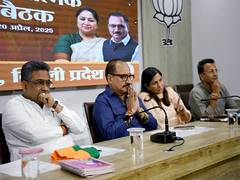National Commission for Women holds consultation on rights of Muslim women in New Delhi
New Delhi [India], July 15 (ANI): The National Commission for Women (NCW) on Saturday conducted a final consultation on the Rights of Muslim Women in order to review the Muslim Personal Law in New Delhi.
The final consultation meeting was attended by Attorney General of India R Venkataramani, the Additional solicitor general from the supreme court, state high courts, Vice Chancellors of renowned law universities and legal luminaries and civil society organisations.
“During the consultation, there was an unequivocal need expressed for the codification of Muslim Personal Law and the need to revisit the marriage and divorce law and guardianship law,” an official statement said.
Attorney General of India, Venkataramani contributed to the discussion by highlighting the need for reforming and strengthening the institution of marriage.
“He emphasised the following points: equal regard for men and women, equal status for men and women, equality of processes ensuring dignity in entering and exiting marital relationships irrespective of religion,” an official statement said.
On the occasion, NCW chairperson Rekha Sharma said, “In our pursuit of equality, let’s reflect: if a law cannot serve the rights of Hindu, Christian, Sikh, and Buddhist women, can we truly say it is just for Muslim women? The need for codified laws is urgent. We need to work towards a legal framework that ensures equal rights for all, regardless of religion.”
The event was moderated by Meenakshi Negi, the Member Secretary of NCW.
NCW said that the focus is on ensuring equal opportunities for all, collaborating with legal authorities to establish a framework that supports children’s well-being and promotes gender equality. The principle of natural guardianship should rest jointly with parents as a rule, and custody should be based on the best interests of the child.
“The discussions also emphasised that absence of a Uniform Civil Code has perpetuated inequalities and inconsistencies in our diverse nation, hindering progress towards social harmony, economic growth, and gender justice. The non-codified nature of Muslim personal law poses challenges for Muslim women, arising to misinterpretation,” the official statement said.
NCW said that during the consultation other points were also discussed included reforming divorce as a judicial process, with exceptions for divorce by mutual consent, and the need to reform inheritance rights based on universal principles governing succession, both testamentary and intestate.






